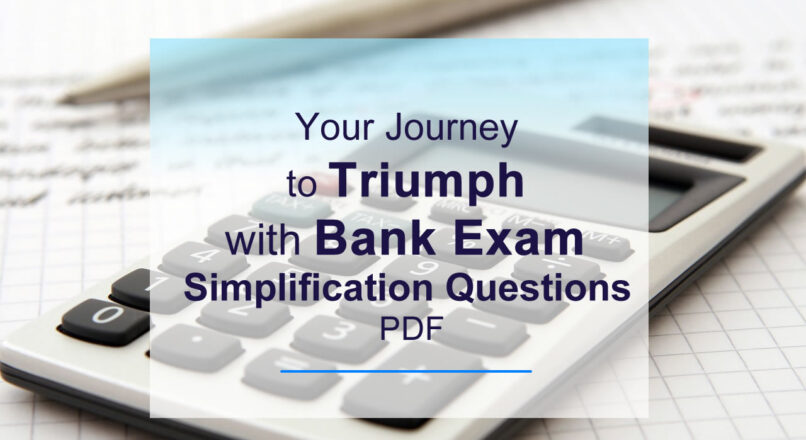
Din reise til triumf med spørsmål om forenkling av bankeksamener PDF
Bank exams are stepping stones to lucrative careers in the financial sector, and one of the crucial sections that candidates often grapple with is simplification. Acing simplification questions is not just about solving mathematical problems but understanding the intricacies of the process. PDFs have become the go-to format for study materials, and mastering simplification through PDF practice is the key to success. This article guides you on a journey to triumph with bank exam questions on simplification, exploring effective strategies and insights for your preparation.
Embracing PDFs for Realistic Preparation:
Digital learning has revolutionised exam preparation, and PDFs are now integral. They provide a realistic simulation of the exam interface, allowing candidates to familiarise themselves with the format and navigation. Practising questions on simplification in PDFs not only aids in adapting to the digital environment but also enhances speed and accuracy in solving mathematical problems.
Building a Strong Foundation in Basic Arithmetic:
Questions on simplification often involve fundamental arithmetic operations such as addition, subtraction, multiplication, and division. Strengthening your foundation in basic arithmetic is crucial. Dedicate time to brush up on mental maths techniques, practice multiplication tables, and enhance your proficiency in handling fractions and percentages. A solid foundation serves as the bedrock for tackling more complex simplification problems.
Strategies for Quick Mental Calculations:
In bank exams, speed is paramount. Developing strategies for quick mental calculations is a game-changer. Practice approximation, rounding off numbers, and identifying shortcuts for everyday calculations. These strategies save valuable time during the exam and reduce the risk of errors, contributing to a higher accuracy rate.
Understanding the Art of Approximation:
Simplification often involves dealing with large numbers. Mastering the art of approximation allows you to quickly estimate the result of a calculation without delving into intricate details. This skill is handy when time is limited. Regular practice with PDFs exposes you to diverse scenarios where approximation can be applied effectively, honing your ability to make swift and accurate estimations.
Breaking Down Complex Problems:
Questions on simplification may appear complex at first glance, involving multiple steps. Develop the skill of breaking down complex problems into simpler components. PDF practice materials often present problems with varying levels of complexity, providing ample opportunities to enhance your problem-solving prowess. By dissecting intricate issues step by step, you can confidently approach them during the actual exam.
Effective Time Management:
Time management is a universal challenge in bank exams, and questions on simplification are no exception. Allocate a specific time frame for simplification within the overall exam duration. During PDF practice, practice solving sets of questions on simplification within these time constraints. This improves your speed and instil a sense of discipline, preventing you from spending too much time on a single problem.
Consistent Practice with Varied Complexity Levels:
Questions on simplification come in various difficulty levels. PDF practice materials often offer a spectrum of complexity, ranging from straightforward calculations to more intricate problems. Consistent practice with questions of varied difficulty levels ensures you are well-prepared for any challenge in the exam. Gradually progressing from more straightforward to more complex issues builds confidence and competence.
Reviewing and Learning from Mistakes:
Mistakes are stepping stones to improvement. During PDF practice, pay close attention to errors and areas where you struggle. Review the solutions, understand the correct approach, and learn from each mistake. This reflective practice reinforces concepts and prevents the recurrence of similar errors during the exam.
Collaborative Learning in Study Groups:
Engage in study groups where simplification PDFs are collectively solved and discussed. Collaborative learning exposes you to different solution approaches, alternative methods, and diverse perspectives. Discussing strategies with peers broadens your problem-solving toolkit, fostering a more comprehensive understanding of simplification techniques.
Konklusjon:
Your journey to triumph with bank exam simplification questions combines mastering fundamental arithmetic, embracing digital learning through PDFs, developing quick mental calculations, and refining your problem-solving strategies. As you commence this journey, remember that success is not solely about reaching the destination but also about evolving and


Legg igjen et svar
Du må Logg Inn eller registrere for å legge til en ny kommentar .